Table of Contents
- 2. SiteGround: Renowned Support and WordPress Tools
- 3. Cloudways: Flexibility and Scalability for Developers
- 4. Kinsta: Premium Managed WordPress Performance
- 5. WP Engine: Enterprise-Grade Managed WordPress Hosting
- 6. Hostinger: Affordable Hosting with Solid Performance
- 7. A2 Hosting: Speed-Focused Hosting Options
- 8. DreamHost: Established Host Recommended by WordPress.org
- 9. Bluehost: Popular Choice for Beginners
- Conclusion
-
+ FAQs
Choosing a web host is a big decision. It impacts your site’s speed, reliability, security, and how easily you can manage things. ChemiCloud offers a solid service, but the web hosting market is vast and varied.
Let’s look at some top contenders that might be a better fit for your specific needs.
1. Elementor Hosting: The Best Hosting for WordPress
As someone who works extensively with WordPress and, specifically, the Elementor page builder, I’ve found this hosting solution uniquely positioned. It’s not just generic WordPress hosting; it’s purpose-built for sites using Elementor.
What Makes It Stand Out?
- Seamless Integration: This is the big one. Elementor Hosting is designed by the same team that builds the Elementor page builder. This means the hosting environment is finely tuned to ensure Elementor runs smoothly and quickly. You get the Elementor Core plugin pre-installed, setting you up for website building right away. While it no longer bundles Elementor Pro, having the Core version ready to go simplifies the initial setup significantly.
- Managed WordPress Environment: This isn’t just shared hosting space. It’s a managed platform. That means Elementor handles many of the technical backend tasks for you. Think server maintenance, security configurations, and performance optimization specifically for WordPress. This frees you up to focus on designing and managing your site content.
- Performance Powerhouse: Elementor Hosting runs on the Google Cloud Platform (GCP). This gives you access to Google’s robust, scalable, and reliable infrastructure. On top of that, they use NVMe SSD storage. This type of storage is significantly faster than traditional SATA SSDs you find with many hosts. Faster storage means quicker loading times for your website files and database. This directly contributes to a better user experience and SEO.
- Built-in Speed Tools: You get a Content Delivery Network (CDN) powered by Cloudflare automatically integrated. A CDN stores copies of your website’s static assets (like images, CSS, and JavaScript) on servers around the world. When someone visits your site, they download these assets from the server closest to them. This dramatically speeds up load times. Premium caching layers are also included to further boost performance.
- Top-Tier Security: Security is non-negotiable. Elementor Hosting provides free SSL certificates (essential for HTTPS), a Web Application Firewall (WAF) to block malicious traffic, DDoS mitigation to protect against denial-of-service attacks, and automatic daily backups. They also perform regular malware scans and offer 24/7 monitoring. This comprehensive security stack provides peace of mind.
- Excellent Support: When you need help, you want knowledgeable support. Elementor Hosting offers 24/7 premium support from experts who understand both hosting and WordPress/Elementor details. This specialized knowledge can be incredibly valuable when troubleshooting issues specific to your Elementor site.
- User-Friendly Management: The hosting dashboard is integrated directly within your My Elementor account. This creates a unified experience where you can manage your website files, database, backups, and Elementor subscription details all in one place. For users already in the Elementor ecosystem, this is incredibly convenient.
Who is it Best For?
Elementor Hosting is an ideal choice for freelancers, agencies, and businesses building websites with Elementor. If you value seamless integration, top performance optimized for your builder, robust security, and expert support tailored to WordPress and Elementor, it’s a compelling option. The managed nature makes it great for those who prefer not to handle complex server administration.
Section Summary: Elementor Hosting offers a powerful, secure, and highly optimized environment specifically for WordPress sites built with Elementor. Using Google Cloud, NVMe storage, Cloudflare CDN, and integrated management, it provides speed, reliability, and ease of use. It’s backed by 24/7 expert support and includes the Elementor Core plugin pre-installed.
2. SiteGround: Renowned Support and WordPress Tools
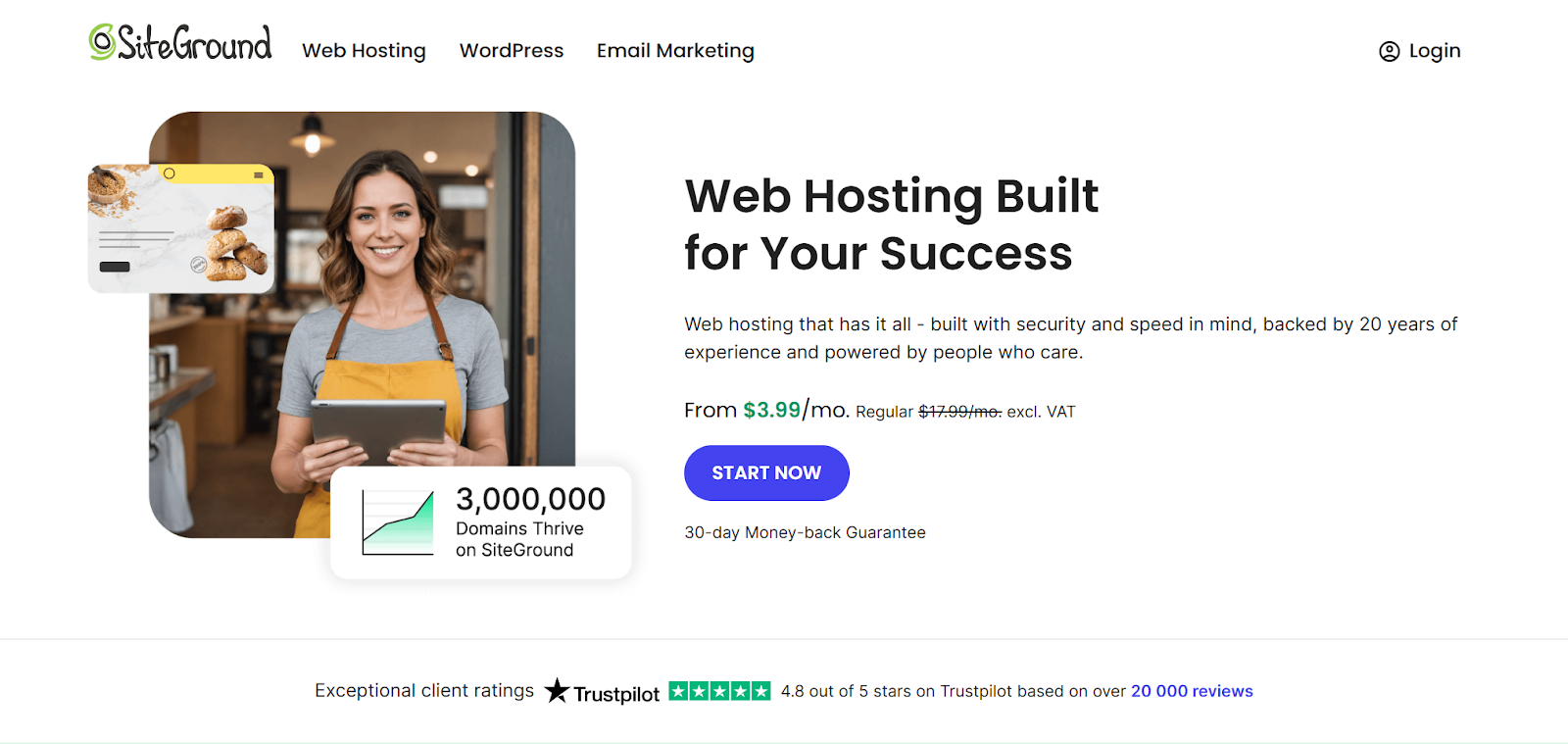
SiteGround consistently earns praise for its customer support and robust WordPress features. They have built a strong reputation over the years.
- Key Strengths: Exceptional 24/7 customer support (known for being fast and helpful), strong focus on WordPress (offering managed updates, staging tools on higher plans, and custom caching), and good performance using Google Cloud infrastructure on most plans. They also offer their own user-friendly control panel called Site Tools.
- Features to Note: Free SSL, daily backups, built-in caching (SuperCacher), Cloudflare CDN integration, and email hosting. They often use SSD storage, though NVMe availability might vary by plan.
Section Summary: SiteGround is a strong contender known for excellent support and WordPress-focused features like staging and optimized caching, running on Google Cloud.
3. Cloudways: Flexibility and Scalability for Developers
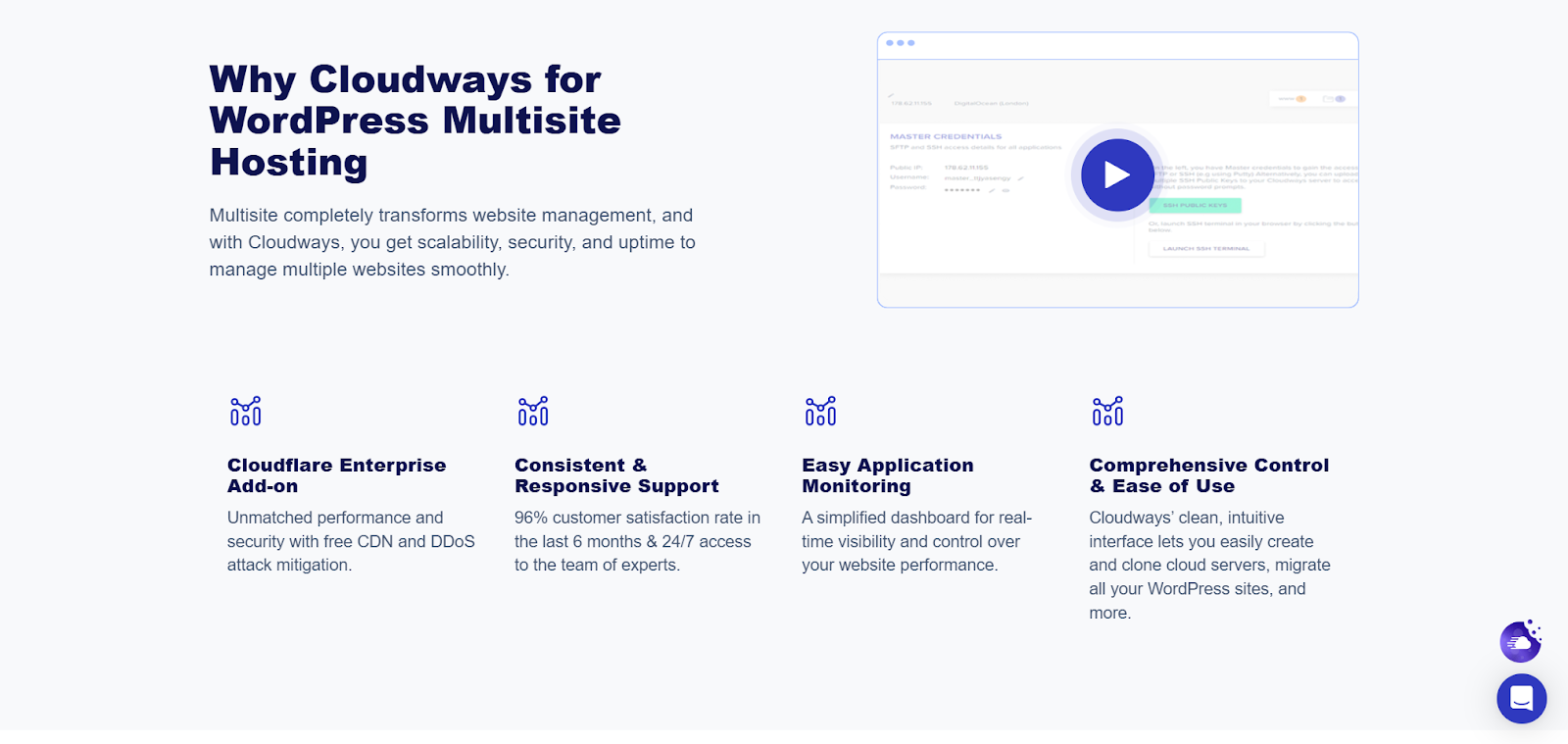
Cloudways operates differently. Instead of providing traditional hosting infrastructure, they offer a managed layer on top of major cloud providers like Google Cloud, AWS, DigitalOcean, Vultr, and Linode.
- Key Strengths: Unmatched flexibility (choose your cloud provider, server location, and specs), excellent scalability (easily resize server resources), performance-focused stack (Nginx, Varnish, Redis, Memcached often pre-configured), and developer-friendly tools (Git integration, SSH/SFTP access, staging environments). They primarily use SSD storage. NVMe availability depends on the chosen underlying cloud provider (e.g., some Vultr and GCP options).
- Features to Note: Free SSL, automated backups, built-in caching options, dedicated firewalls, 24/7 support (though advanced support might cost extra), and their own platform for server management.
Section Summary: Cloudways provides exceptional flexibility and scalability by managing servers on top cloud providers. It’s ideal for developers and agencies needing fine-tuned control and growth potential.
4. Kinsta: Premium Managed WordPress Performance
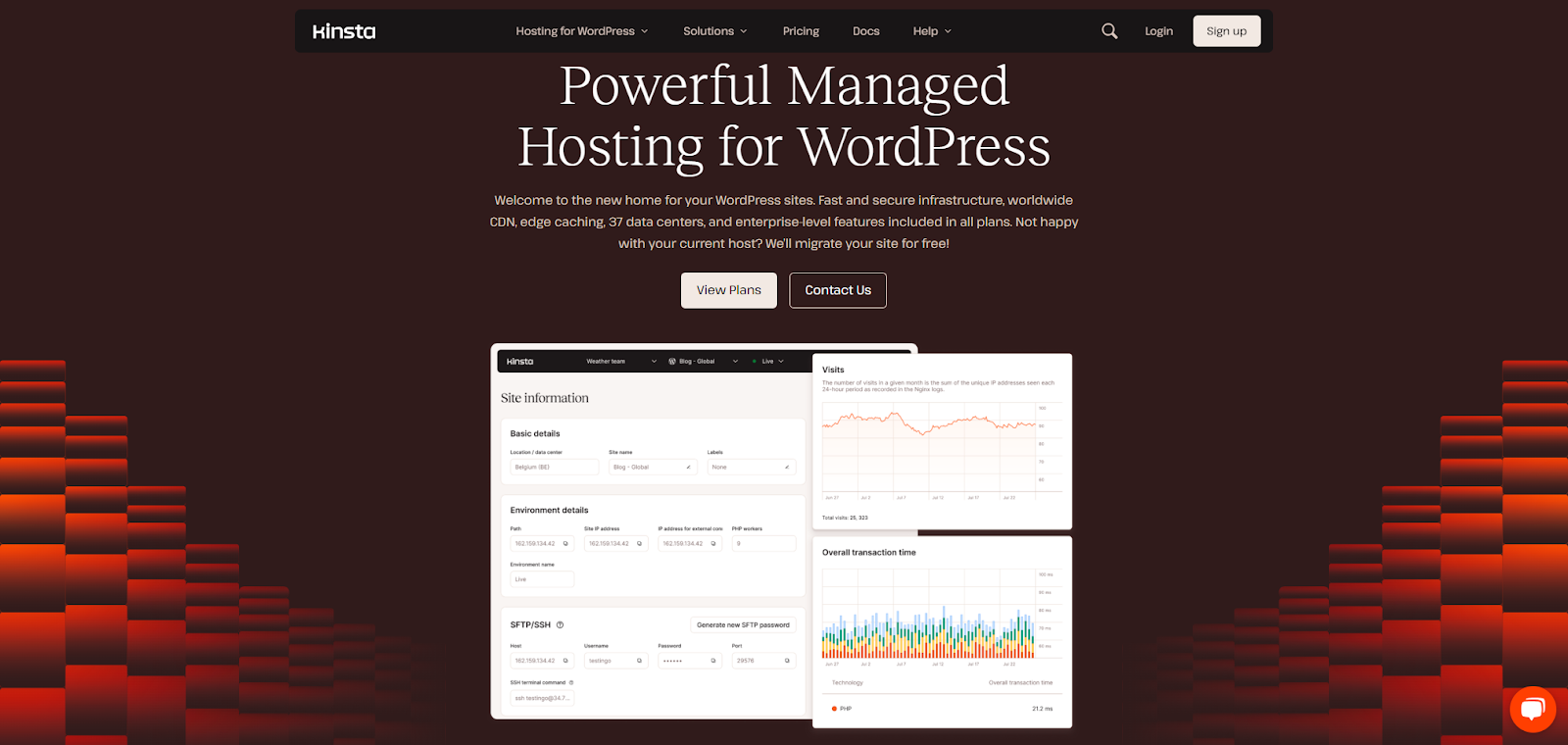
Kinsta focuses exclusively on premium managed WordPress hosting. It targets users who need top-tier performance, reliability, and support for demanding websites.
- Key Strengths: Built entirely on the Google Cloud Platform’s premium tier network. This ensures excellent global speed and reliability. It features a highly optimized architecture specifically for WordPress, automatic scaling during traffic surges, top-notch security features, and expert WordPress support available 24/7. They use NVMe storage for high-performance database and file access.
- Features to Note: Free SSL and CDN, daily backups, staging environments on all plans, site monitoring, hack-fix guarantee, and a custom-designed user-friendly dashboard (MyKinsta).
Section Summary: Kinsta offers premium, high-performance managed WordPress hosting built on Google Cloud’s premium tier with NVMe storage. It provides excellent security and expert support, suited for demanding websites.
5. WP Engine: Enterprise-Grade Managed WordPress Hosting
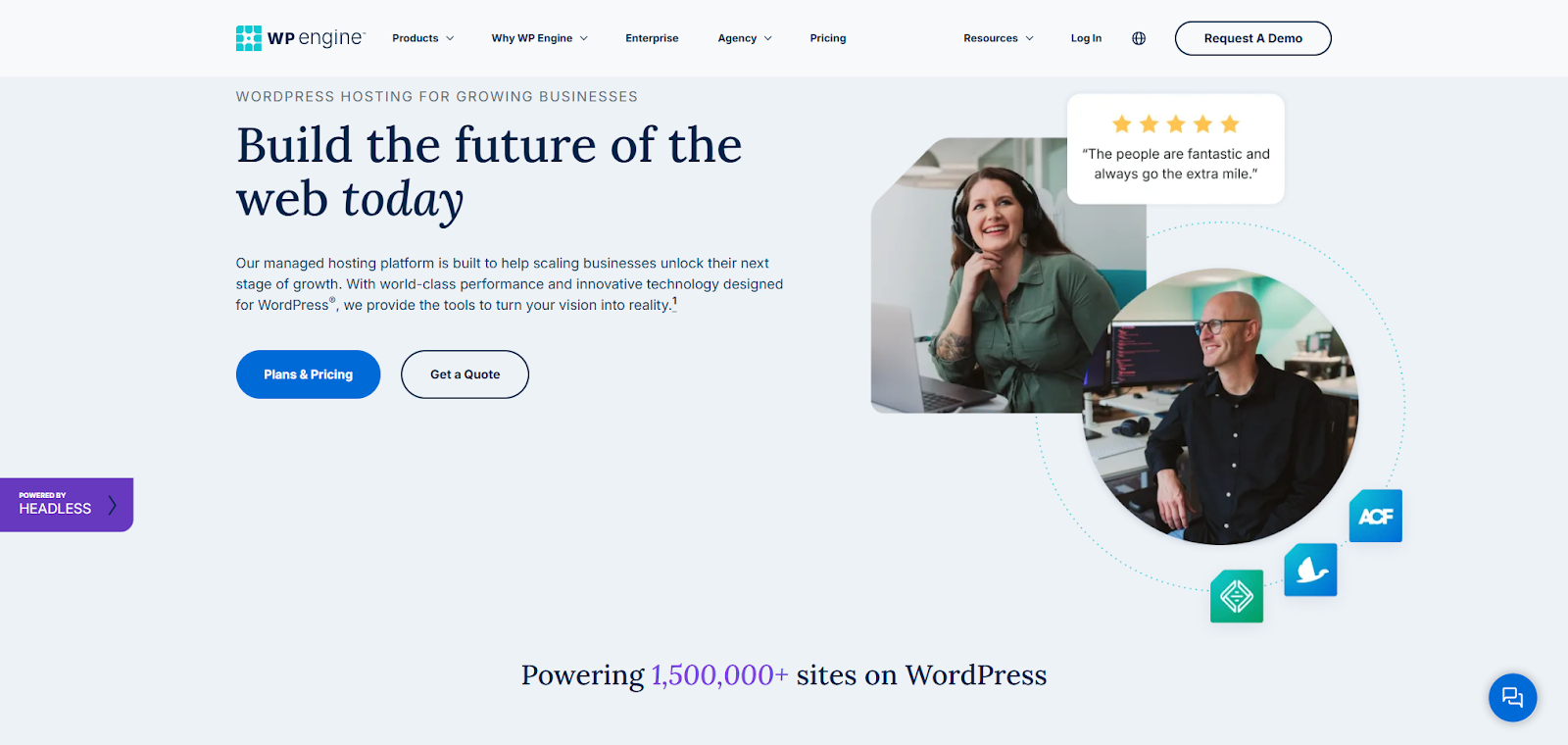
Similar to Kinsta, WP Engine is a major player in the premium managed WordPress hosting space. It’s known for its robust platform, developer tools, and focus on security and speed.
- Key Strengths: Strong performance infrastructure often using cloud providers like AWS and Google Cloud. Excellent security measures (including proactive threat detection). Genesis Framework and StudioPress themes included. Dedicated developer tools (Git integration, staging, development, production environments). 24/7 expert WordPress support. Storage types can vary, but they focus heavily on optimized configurations, often including SSDs or NVMe in newer setups.
- Features to Note: Free SSL, global CDN, automated daily backups, proprietary caching (EverCache), user-friendly portal.
Section Summary: WP Engine provides enterprise-grade managed WordPress hosting. It has a strong focus on performance, security, developer workflows (including multiple environments), and expert support.
6. Hostinger: Affordable Hosting with Solid Performance
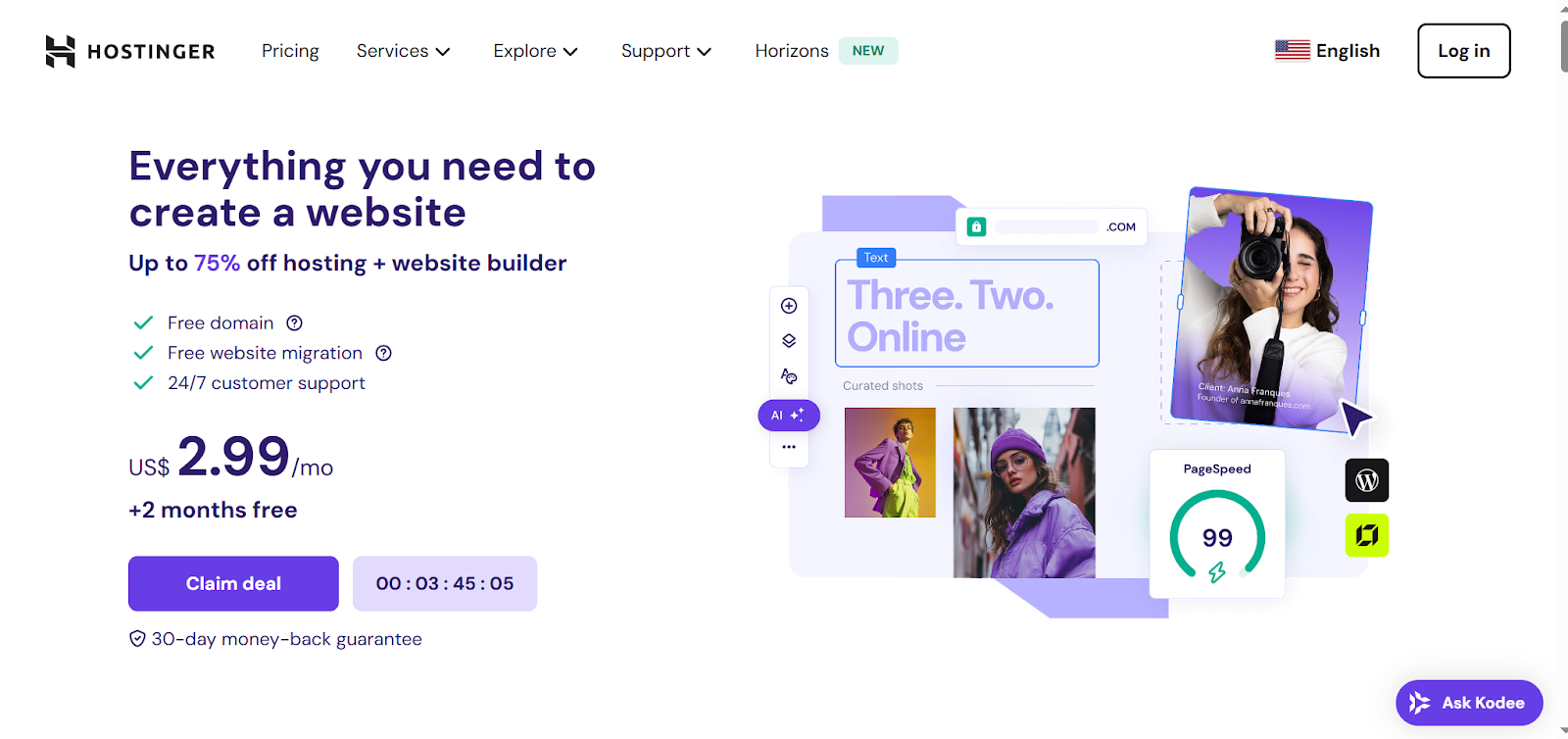
Hostinger has gained significant popularity by offering feature-rich hosting plans at very competitive price points. This makes it attractive for beginners and budget-conscious users.
- Key Strengths: Affordability is their main draw. They often run promotions making their initial terms very cheap. Despite the low cost, they generally offer good performance for the price. They often use LiteSpeed web servers (known for speed) and SSD storage. Some higher-tier plans may offer NVMe storage. Their custom control panel, hPanel, is generally considered user-friendly.
- Features to Note: Free SSL, free domain (often with annual plans), email hosting included, managed WordPress features (auto-updates, basic caching), weekly or daily backups (depending on the plan), and 24/7 support.
Section Summary: Hostinger is a popular choice for its highly affordable introductory pricing, user-friendly hPanel, and decent performance using technologies like LiteSpeed servers.
7. A2 Hosting: Speed-Focused Hosting Options

A2 Hosting built its brand around speed. It heavily markets its “Turbo” plans which promise significantly faster page loads using optimized server configurations.
- Key Strengths: Strong emphasis on speed, particularly with their Turbo plans featuring NVMe storage, LiteSpeed web server, and advanced caching. They offer a wide range of hosting types (shared, VPS, dedicated, reseller) catering to various needs. Developer-friendly options are available.
- Features to Note: Free SSL, free site migration (usually for one site), choice of data center locations, SSD storage standard on most plans (NVMe on Turbo), anytime money-back guarantee (prorated), 24/7 “Guru Crew” support.
Section Summary: A2 Hosting prioritizes speed, offering Turbo plans with NVMe storage and LiteSpeed servers. It also provides a wide variety of hosting types and developer-friendly features.
8. DreamHost: Established Host Recommended by WordPress.org
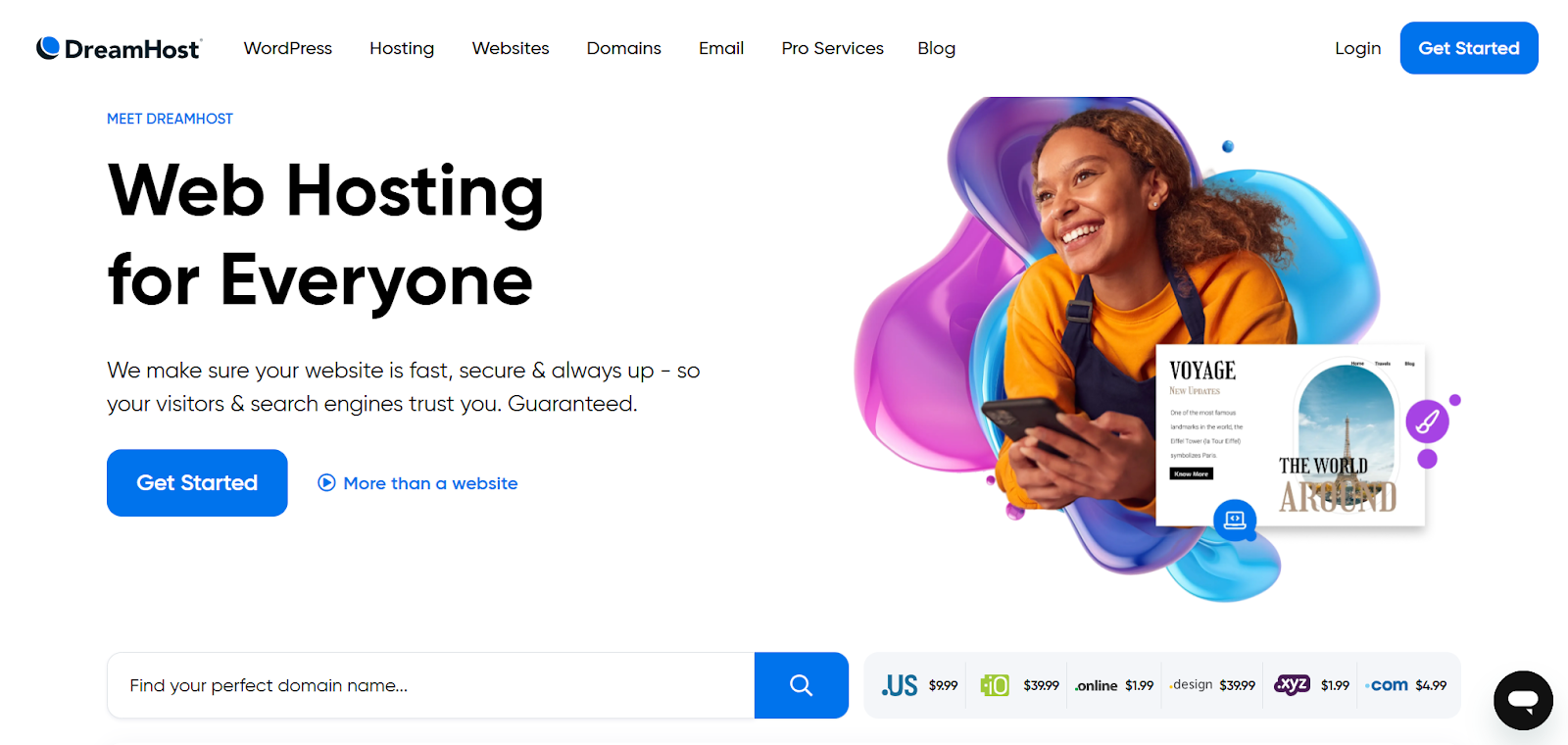
DreamHost is a long-standing, independent hosting provider officially recommended by WordPress.org. They are known for their reliable service and generous policies.
- Key Strengths: Official WordPress recommendation. Strong commitment to open source. Generous storage limits on shared plans. Solid uptime record. A lengthy 97-day money-back guarantee on shared hosting. They use SSD storage for performance.
- Features to Note: Free domain (with annual plans), free SSL certificate, automated WordPress installation and updates, custom control panel, unlimited traffic (subject to acceptable use policy), free automated WordPress migrations.
Section Summary: DreamHost is an established, WordPress-recommended host known for reliability and generous policies like SSD storage and a long money-back guarantee. It uses a custom control panel.
9. Bluehost: Popular Choice for Beginners

Bluehost is one of the most well-known names in web hosting. It’s particularly popular among beginners and WordPress users. This is partly due to its own WordPress.org recommendation and user-friendly approach.
- Key Strengths: Beginner-friendly interface and setup process. Official WordPress.org recommendation. Often includes a free domain name for the first year. Free SSL certificate. Integrates well with WordPress, offering a dedicated dashboard for WP management. They typically use SSD storage.
- Features to Note: Free CDN (Cloudflare integration), straightforward cPanel access (on most plans), various hosting tiers including specialized WordPress and WooCommerce plans, 24/7 support.
Section Summary: Bluehost is a very popular host, especially for beginners. It offers a user-friendly experience, WordPress recommendation, free domain, and SSL, though renewal costs are higher.
Choosing the Right Hosting Alternative for Your Needs
Okay, we’ve looked at nine different hosting providers, each with its strengths. But how do you actually decide which one is the right fit for you? It’s not just about picking the one with the flashiest features. It’s about matching the hosting service to your specific requirements. Let’s break down the key factors to consider.
Optimization for WordPress and WooCommerce
If your website runs on WordPress (and maybe WooCommerce for e-commerce), this is a huge factor. Why? Because generic hosting isn’t always tuned for WordPress’s specific needs.
What to Look For:
- Server-Level Caching: Hosts optimized for WordPress often put caching systems like Varnish, Nginx microcaching, or Redis object caching directly on the server. This drastically speeds up your site compared to relying only on plugin-based caching.
- PHP Version Management: Easy access to the latest stable PHP versions is crucial for WordPress performance and security. Optimized hosts make switching PHP versions simple.
- Managed Updates: Some hosts offer managed WordPress core, plugin, or theme updates. This can be a time-saver but requires trust in their process.
- Expert WordPress Support: Can the support team actually help with WordPress-specific issues, or just basic server problems? This is vital.
- WooCommerce Specifics: If you run an online store, look for hosts that mention specific WooCommerce optimization. E-commerce sites have higher resource demands (database queries, dynamic content).
Why It Matters:
A host optimized for WordPress will generally provide better performance, stronger security against WordPress-specific threats, and more knowledgeable support when you encounter platform-related issues. For instance, Elementor Hosting is inherently designed around WordPress and Elementor, ensuring deep optimization.
Assessing Your Website Needs
Before you compare plans, take stock of your own website.
- Traffic Volume: How many visitors do you get now? How many do you expect in the near future? Low-traffic blogs have very different needs than busy e-commerce sites. Be realistic but also consider potential growth.
- Storage Space: How large is your website currently (files and database)? Do you upload lots of large media files (videos, high-res images)? Check the storage limits (often in GB) offered by plans. NVMe storage, offered by hosts like Elementor Hosting, Kinsta, and A2 Hosting’s Turbo plans, provides a significant speed boost over traditional SSDs.
- Functionality: Are you running a simple blog, a portfolio site, a complex membership site, or an online store? More complex sites generally require more server resources (CPU, RAM).
- Technical Expertise: Are you comfortable managing server settings? Or do you prefer a managed solution where the host handles the technical heavy lifting?
Considering Future Growth
Your hosting choice today should ideally accommodate your growth tomorrow.
- Scalability: How easy is it to upgrade your plan or resources as your traffic increases? Shared hosting offers limited scalability. Managed WordPress hosts often allow seamless upgrades. Cloud hosting (like Cloudways) provides the most flexibility to scale resources up or down.
- Hosting Tiers: Does the provider offer higher tiers like VPS (Virtual Private Server) or dedicated servers if you outgrow their initial offerings? Migrating between hosting types can be more complex than just upgrading a plan.
Budget Constraints
Hosting costs can range from a few dollars a month to hundreds or even thousands.
- Introductory vs. Renewal Pricing: Be very aware of this! Many hosts (like Hostinger, Bluehost, SiteGround) offer steep discounts for the first term. But prices jump significantly upon renewal. Factor the long-term cost into your decision.
- Value vs. Price: The cheapest option isn’t always the best value. Consider the performance, features, support, and reliability you get for the price. Downtime or slow speeds can cost you more in lost revenue or reputation than a slightly more expensive, reliable host.
- Included Features: Does the price include essentials like SSL certificates, backups, CDN, email hosting, and staging environments? Or are these paid add-ons? Factor these into your total cost comparison.
Importance of Reliability and Uptime
Your website needs to be accessible. Downtime means lost visitors, lost potential revenue, and a negative impact on your reputation and SEO.
- Uptime Guarantee (SLA): Look for hosts offering an uptime guarantee, typically 99.9% or higher. This is often part of their Service Level Agreement (SLA). Understand how they compensate you if they fail to meet this guarantee (usually hosting credits).
- Infrastructure: Providers using major cloud platforms (like Google Cloud, used by Elementor Hosting, Kinsta, and SiteGround) often benefit from the built-in reliability and redundancy of that infrastructure.
- Monitoring: Does the host actively monitor their servers and your site for potential issues? Proactive monitoring can prevent problems before they cause downtime.
Servers with NVMe Storage
We touched on this earlier, but it deserves its own point because it directly impacts speed.
- What it is: NVMe (Non-Volatile Memory Express) is a modern way to access high-speed storage media like SSDs. It’s much faster than the older SATA interface used by traditional SSDs and HDDs.
- Why it Matters: Faster storage means faster loading of your website files, operating system, and database. This translates directly to quicker page load times. This is especially true for dynamic websites that rely heavily on database queries (like WordPress and WooCommerce).
- Who Offers It: Elementor Hosting, Kinsta, A2 Hosting (Turbo plans), and some configurations on Cloudways (depending on the underlying provider) explicitly offer NVMe storage. Check the specifics of the plan you’re considering.
Importance of 24/7 Expert Support
When things go wrong (and sometimes they do), you need help quickly and efficiently.
- Availability: Is support available 24/7? What channels do they offer (live chat, phone, email, tickets)? Live chat and phone are generally preferred for urgent issues.
- Expertise: This is crucial. Does the support team understand WordPress? Can they help beyond basic server questions? For managed WordPress hosts like Elementor Hosting, Kinsta, or WP Engine, specialized WordPress expertise is a key selling point. Generic hosts might have support staff less familiar with platform-specific issues.
- Response Times: Check reviews or ask potential hosts about their average response times for different support channels. Waiting hours for help during a site outage is stressful.
User-Friendly Interface
Managing your hosting account shouldn’t require a computer science degree.
- Control Panel: Most hosts offer a control panel to manage your website files, databases, domains, email accounts, backups, etc. Common options include cPanel (widely used), Plesk, or custom panels (like Elementor Hosting’s integrated dashboard, SiteGround’s Site Tools, Kinsta’s MyKinsta, or Hostinger’s hPanel).
- Ease of Use: Is the interface intuitive? Can you easily find the tools you need? Some custom panels are designed to be simpler and more focused than the sometimes overwhelming options in cPanel. Elementor Hosting’s integration into the My Elementor dashboard offers a streamlined experience for Elementor users.
Section Summary: Choosing the right host involves evaluating WordPress/WooCommerce optimization, your site’s specific needs (traffic, storage), future growth potential, budget (including renewal rates), and reliability (uptime, NVMe storage). Also consider support quality and expertise, and the user-friendliness of the management interface. Carefully weigh these factors against the offerings of each potential provider.
Grow Your Sales
- Incredibly Fast Store
- Sales Optimization
- Enterprise-Grade Security
- 24/7 Expert Service

- Incredibly Fast Store
- Sales Optimization
- Enterprise-Grade Security
- 24/7 Expert Service
- Prompt your Code & Add Custom Code, HTML, or CSS with ease
- Generate or edit with AI for Tailored Images
- Use Copilot for predictive stylized container layouts

- Prompt your Code & Add Custom Code, HTML, or CSS with ease
- Generate or edit with AI for Tailored Images
- Use Copilot for predictive stylized container layouts
- Craft or Translate Content at Lightning Speed
Top-Performing Website
- Super-Fast Websites
- Enterprise-Grade Security
- Any Site, Every Business
- 24/7 Expert Service

Top-Performing Website
- Super-Fast Websites
- Enterprise-Grade Security
- Any Site, Every Business
- 24/7 Expert Service
- Drag & Drop Website Builder, No Code Required
- Over 100 Widgets, for Every Purpose
- Professional Design Features for Pixel Perfect Design

- Drag & Drop Website Builder, No Code Required
- Over 100 Widgets, for Every Purpose
- Professional Design Features for Pixel Perfect Design
- Marketing & eCommerce Features to Increase Conversion
- Ensure Reliable Email Delivery for Your Website
- Simple Setup, No SMTP Configuration Needed
- Centralized Email Insights for Better Tracking

- Ensure Reliable Email Delivery for Your Website
- Simple Setup, No SMTP Configuration Needed
- Centralized Email Insights for Better Tracking

- Ensure Reliable Email Delivery for Your Website
- Simple Setup, No SMTP Configuration Needed
- Centralized Email Insights for Better Tracking
Migration Considerations
So, you’ve chosen a new hosting provider. Great! Now comes the potentially tricky task: moving your website from ChemiCloud to your new host. Planning this process carefully is key to minimizing headaches and downtime.
Data Transfer Process
Getting your website files and database from the old server to the new one is the core of the migration.
- Manual Migration: This involves downloading your website files (usually via FTP/SFTP or the File Manager in your old host’s control panel) and exporting your database (typically using phpMyAdmin). Then, you upload the files to the new server and import the database. This requires some technical comfort but gives you full control.
- Migration Plugins (WordPress): Numerous WordPress plugins (like Duplicator, WP Migrate DB, All-in-One WP Migration) can help bundle your site into a package for easier transfer. Some work very well. But large sites or certain server configurations can sometimes cause issues.
- Host Migration Services: Many hosting providers offer free or paid migration services.
- Free Migrations: Often included with new hosting plans (e.g., Elementor Hosting, SiteGround, A2 Hosting may offer one free migration). These are usually handled by the host’s support team. Check the terms – sometimes they only cover simple WordPress sites or use automated tools.
- Paid Migrations: For more complex sites or guaranteed expert handling, paid services are available from the host or third-party specialists.
- What’s Involved: Ensure all necessary files (WordPress core, themes, plugins, uploads) and the entire database are transferred accurately.
Domain Name Management
Your domain name (e.g., yourwebsite.com) needs to point to the new hosting server.
- Transferring the Domain: You can move your domain registration from your current registrar (which might be ChemiCloud or another company) to your new host or a dedicated domain registrar. This centralizes billing but involves unlocking the domain, getting an authorization code (EPP code), and waiting for the transfer process (can take several days).
- Pointing the DNS: A simpler and often faster approach is to leave your domain registration where it is. Just update its Domain Name System (DNS) records (specifically the A record and possibly CNAME records) to point to the IP address of your new hosting server. Your new host will provide the necessary IP address or nameservers. DNS changes can take anywhere from a few minutes to 48 hours to spread globally.
Email Hosting Options
Don’t forget about your email accounts associated with your domain (e.g., you@yourwebsite.com).
- Does the New Host Include Email? Some hosts include email hosting (like SiteGround, Hostinger). Others treat it as an add-on (like DreamHost’s basic plans) or don’t offer it directly (like Cloudways, Kinsta, often recommending dedicated services). Elementor Hosting focuses on the website hosting itself.
- Migrating Emails: If your new host provides email and you want to move existing messages, this can be tricky. Some hosts offer email migration tools. Or you might need to use third-party services or manually move emails using an email client like Outlook or Thunderbird via IMAP.
- Dedicated Email Services: Often, the most robust solution is to use a dedicated email provider like Google Workspace or Microsoft 365. These offer better deliverability, security, and features than typical bundled hosting email. You just need to update your domain’s MX records (Mail Exchanger) to point to the email service provider.
Avoiding Downtime During Migration
The goal is a seamless transition with zero or minimal interruption for your visitors.
- Timing: Schedule the migration during your website’s lowest traffic period (e.g., late at night or on a weekend, depending on your audience).
- Testing: Before changing your DNS, upload your site files and database to the new host. Most hosts provide a temporary URL or let you modify your computer’s hosts file to preview the site on the new server before it’s live. Test thoroughly to ensure everything works correctly.
- DNS Propagation: Once you update your DNS records to point to the new server, it takes time for the changes to spread across the internet. During this propagation period (minutes to 48 hours), some visitors might hit the old server, and some might hit the new one. Avoid making major site changes during this window. Lowering the TTL (Time To Live) value on your DNS records before the migration can sometimes speed this up.
- Keep Old Hosting Active: Don’t cancel your ChemiCloud account immediately after pointing the DNS. Keep it active for a few days or even a week. This ensures propagation is complete and you have a fallback if unexpected issues arise on the new host.
One-Click Migration
Some hosts and tools aim to simplify the migration process significantly, often marketing it as “one-click.”
- Host Tools: Providers like Elementor Hosting may offer integrated tools or streamlined processes specifically designed for migrating WordPress sites onto their platform. Check their documentation or support for details.
- Plugin Functionality: Plugins like All-in-One WP Migration or Duplicator Pro offer very user-friendly interfaces that can feel close to one-click for standard sites.
- Reality Check: While these tools are incredibly helpful, true “one-click” is rare for anything beyond the simplest sites. There might still be steps like installing the plugin, generating the backup, uploading it, and running the restore process. However, they automate many of the technical file/database handling steps.
Section Summary: Successful migration involves choosing a data transfer method (manual, plugin, host service) and managing your domain name (transfer vs. DNS pointing). You also need to consider email hosting options, plan carefully to avoid downtime (testing, timing), and potentially use simplified “one-click” migration tools offered by hosts or plugins.
Optimizing Your Website on New Hosting
Moving to a potentially faster, better-resourced host is a great start, but don’t stop there! You can further enhance your website’s performance and reliability. Take advantage of your new environment and put optimization best practices in place.
Performance Tuning Tips
Your hosting environment is just one piece of the speed puzzle. Your website itself plays a huge role.
- Image Optimization: Large image files often cause slow load times. Use tools or plugins (like Smush, ShortPixel, Imagify) to compress images without sacrificing visual quality. Serve images in modern formats like WebP where possible. Ensure images are properly sized (don’t upload a 3000px wide image for a 600px space).
- Code Minification: Minify your CSS and JavaScript files. This process removes unnecessary characters (like whitespace and comments) from the code. This reduces file sizes and speeds up download and parsing times. Many caching plugins offer this feature.
- Database Optimization: WordPress databases can become bloated over time with post revisions, transients, spam comments, and leftover data from plugin/theme uninstalls. Use plugins like WP-Optimize or Advanced Database Cleaner to regularly clean and optimize your database tables.
- Theme and Plugin Audit: Use lightweight, well-coded themes. Deactivate and delete any plugins you aren’t actively using. Too many plugins, or even one poorly coded plugin, can significantly slow down your site. Use tools like Query Monitor to identify slow plugins or queries.
- Limit External Scripts: Be mindful of how many third-party scripts you’re loading (analytics, ad networks, social media widgets, font libraries). Each external HTTP request adds to your load time.
Leveraging Caching and CDN
These are two of the most effective ways to boost speed. Your new host likely offers tools for them.
Caching:
- Page Caching: Your host (especially managed WordPress hosts like Elementor Hosting, Kinsta, WP Engine, SiteGround) likely provides server-level page caching. This stores static HTML copies of your pages. They don’t need to be dynamically generated by PHP and the database for every visitor. Ensure this is enabled and configured correctly. If your host doesn’t offer robust server caching, use a well-regarded caching plugin (like WP Rocket, W3 Total Cache, or WP Super Cache).
- Browser Caching: Instructs visitors’ browsers to store static assets (images, CSS, JS) locally. When they revisit your site, these assets load from their computer instead of re-downloading. This makes later page loads much faster. This is usually set up via server rules (.htaccess or Nginx config) or caching plugins.
- Object Caching: For sites with many database queries, object caching systems like Redis or Memcached can store frequently accessed query results in memory. This reduces database load. Some hosts offer this, particularly on higher-tier plans or cloud setups (like Cloudways).
Content Delivery Network (CDN):
- How it Works: A CDN stores copies of your static files (images, CSS, JS) on servers located around the globe. When a user visits your site, the CDN delivers these files from the server geographically closest to them.
- Benefits: Reduces latency (delay), speeds up global load times, and reduces load on your main server.
- Implementation: Many hosts (like Elementor Hosting, Kinsta, SiteGround, WP Engine, Bluehost) offer integrated CDN services, often powered by Cloudflare. Setting it up is usually just a matter of enabling the option in your hosting dashboard. If not included, you can sign up for a CDN service like Cloudflare (they have a popular free plan) directly.
Cloud-Based Infrastructure Benefits
If your new host uses cloud infrastructure (like Elementor Hosting on Google Cloud, or Kinsta, SiteGround, Cloudways options), understand the advantages:
- Scalability: Cloud platforms are designed to handle changing traffic loads more easily than traditional single servers. Your host can often allocate more resources (CPU, RAM) automatically or quickly when needed.
- Reliability: Cloud providers typically have massive redundancy built-in (multiple servers, network connections, power sources). This leads to higher uptime and tolerance for failures compared to single-server setups.
- Performance: Access to vast networks and data centers spread geographically can lead to better global performance and connectivity.
Regular Maintenance Best Practices
Optimization isn’t a one-time task. Keep your site running smoothly with ongoing maintenance.
- Updates: Keep everything updated: WordPress core, themes, and plugins. Updates often contain crucial security patches and performance improvements. Test updates on a staging site first if possible.
- Backups: Ensure your host’s automated backups are running correctly. It’s also wise to occasionally take your own manual backups and store them offsite (e.g., cloud storage like Google Drive or Dropbox). Regularly test your ability to restore from a backup.
- Security Scans: Even with host security, periodically run security scans using plugins (like Wordfence or Sucuri Scanner) to check for malware or vulnerabilities.
- Performance Monitoring: Regularly check your site’s speed using tools like Google PageSpeed Insights, GTmetrix, or Pingdom. Monitor your uptime using external services.
Section Summary: Optimize your site on its new hosting by tuning website performance (images, code, database, plugins). Effectively use caching (page, browser, object) and CDNs provided by your host. Understand the benefits of cloud infrastructure if applicable. And commit to regular maintenance (updates, backups, security scans, performance checks).
Security Best Practices for Web Hosting
Moving to a secure host is essential, but website security is a shared responsibility. Implementing best practices on your end, combined with your host’s security measures, creates a strong defense against threats. Let’s cover the key areas.
SSL Certificates and HTTPS
This is non-negotiable today.
- What it is: An SSL (Secure Sockets Layer) certificate encrypts the data exchanged between your website and visitors’ browsers. HTTPS (HyperText Transfer Protocol Secure) is the secure version of HTTP, enabled by SSL.
- Why it Matters: Protects sensitive information (login details, contact forms, payment details). Builds visitor trust (browsers flag non-HTTPS sites as “Not Secure”). It’s also a confirmed Google ranking factor.
- Implementation: Virtually all reputable hosts, including Elementor Hosting and the others listed, provide free SSL certificates, often via Let’s Encrypt. Ensure your certificate is installed and your website is set up to force HTTPS connections (usually a setting in WordPress or via your hosting panel).
Firewall Configuration
Firewalls act as gatekeepers, blocking malicious traffic before it reaches your site.
- Web Application Firewall (WAF): A WAF specifically filters, monitors, and blocks HTTP traffic to and from a web application. It can protect against common attacks like SQL injection, cross-site scripting (XSS), and malicious file uploads. Many premium hosts (like Elementor Hosting, Kinsta, SiteGround on higher plans) include a WAF. You can also use cloud-based WAF services like Cloudflare or Sucuri.
- Network Firewall: Operates at the server level, controlling access based on IP addresses and ports. This is typically managed by your hosting provider.
Regular Security Audits
Don’t assume you’re safe. Proactively look for weaknesses.
- Malware Scanning: Use security plugins (Wordfence, Sucuri Scanner, MalCare) or host-provided tools to regularly scan your website files and database for malware, backdoors, and malicious code. Elementor Hosting includes malware scanning.
- Vulnerability Checks: Keep track of known vulnerabilities in WordPress core, plugins, and themes. Update promptly when patches are released. Some security plugins also check for outdated software with known vulnerabilities.
Backup and Disaster Recovery Plans
If the worst happens (hack, server failure, critical error), backups are your lifeline.
- Frequency: Daily automated backups are the minimum standard for active websites. Elementor Hosting provides this.
- Retention: How long are backups kept? 30 days is a common retention period.
- Storage Location: Backups should be stored offsite (on a separate server or cloud storage) so they aren’t affected if your primary server is compromised.
- Easy Restoration: Ensure you know how to restore your site from a backup quickly and easily. Test the process periodically. Having multiple backup methods (host backups + your own) is wise.
WAF, DDoS & BotNet Protection
These address specific, common threats.
- WAF: As mentioned, crucial for filtering application-level attacks.
- DDoS Protection: Distributed Denial of Service attacks flood your server with traffic. They overwhelm it and make your site unavailable. Good hosts (including Elementor Hosting) put DDoS mitigation measures in place at the network level to absorb or filter this malicious traffic.
- BotNet Protection: Malicious bots scan sites for vulnerabilities, attempt brute-force logins, scrape content, and spam forms. A good WAF and specific bot protection rules (often included with services like Cloudflare or host security suites) can block harmful bot activity.
Multi-Factor Authentication (MFA)
Secure your hosting account and WordPress admin login.
- How it Works: Requires not just a password but also a second factor (like a code from an authenticator app on your phone, an SMS code, or a security key) to log in.
- Why it Matters: Makes it significantly harder for attackers to gain unauthorized access, even if they guess or steal your password.
- Implementation: Check if your hosting provider offers MFA for account login. For WordPress admin access, use security plugins that support MFA (e.g., Wordfence, Google Authenticator plugins).
24/7 Monitoring
Your host should be watching their infrastructure constantly.
- Server Health: Monitoring CPU usage, RAM, disk I/O, and network connectivity to proactively address performance issues or potential failures.
- Security Monitoring: Actively looking for suspicious activity, intrusion attempts, and malware outbreaks across their network. Elementor Hosting provides 24/7 monitoring as part of its managed service.
Auto Security Updates
This can be a double-edged sword but is often beneficial for security.
- Managed Hosts: Providers like Elementor Hosting, Kinsta, and WP Engine may offer managed WordPress core updates. They automatically apply security patches quickly.
- Plugins/Themes: Some hosts or security plugins can also automatically update plugins and themes. This carries a slightly higher risk of compatibility issues. Weigh the convenience against the risk based on your site’s complexity.
DB/SFTP Access
Secure methods for accessing your database and files are essential.
- SFTP (SSH File Transfer Protocol): Always use SFTP instead of standard FTP. SFTP encrypts both your login credentials and the data being transferred.
- Database Access: Access your database management tool (like phpMyAdmin) over HTTPS. Use strong, unique database passwords. Limit remote database access unless absolutely necessary.
- Strong Credentials: Use strong, unique passwords for your hosting account, SFTP users, database users, and WordPress admin accounts. Use a password manager.
Automatic Updates (WordPress)
WordPress itself has built-in automatic update capabilities.
- Core Updates: By default, WordPress automatically applies minor core releases (e.g., 6.1.1 to 6.1.2) which primarily contain security fixes. You can enable automatic updates for major core releases (e.g., 6.1 to 6.2) as well, but testing is recommended.
- Plugin/Theme Updates: You can enable auto-updates for individual plugins and themes directly within the WordPress dashboard. Use this cautiously, especially for complex plugins, as updates can sometimes cause conflicts.
Dev, Stage, Prod Environments
For anything beyond a simple brochure site, using separate environments is a professional best practice.
- Development (Dev): Your local machine or a private online space where you build new features or make major changes.
- Staging (Stage): A private clone of your live site hosted on the server. Use this to test updates, new plugins, or design changes before pushing them live. Many managed WordPress hosts (like Elementor Hosting, Kinsta, WP Engine, SiteGround) offer easy one-click staging environments.
- Production (Prod): Your live website that visitors see.
- Benefit: Allows you to test changes thoroughly without risking breaking your live site.
Zero Handshake TLS
This is a feature of the modern TLS 1.3 protocol, aimed at speeding up secure connections.
- How it Works: For returning visitors whose browsers support TLS 1.3, it allows the encrypted connection to be established more quickly (with “zero round trips” after the initial visit) compared to older TLS versions.
- Benefit: Improves HTTPS performance, making your secure site feel faster.
- Availability: Modern web servers and CDNs (like Cloudflare) widely support TLS 1.3. Ensure your hosting environment is up-to-date to take advantage of these performance benefits.
Section Summary: Robust web hosting security involves using host features (SSL, WAF, DDoS protection, monitoring, backups) and putting user-side best practices in place (strong passwords, MFA, regular audits, secure access methods like SFTP, careful updates, and using staging environments). Ensure HTTPS is enforced, backups are reliable, and you actively monitor for threats.
The Future of Web Hosting
The web hosting landscape is constantly evolving. Technologies that seem cutting-edge today become standard tomorrow. Staying aware of these trends can help you make future-proof decisions and understand where the industry is heading.
Emerging Technologies in Hosting
Several technologies are reshaping how websites and applications are hosted.
- Containerization (Docker, Kubernetes): Instead of virtualizing entire operating systems (like traditional VPS), containers package an application and its dependencies together. This allows for greater efficiency, faster deployment, and easier scaling. Kubernetes manages these containers, handling complex applications across multiple servers. While often more relevant for complex applications than standard websites, the principles influence modern hosting architectures.
- Serverless Computing: With serverless (like AWS Lambda, Google Cloud Functions), you run code in response to events without managing any underlying servers. The cloud provider automatically handles setup, scaling, and infrastructure management. This is often used for specific functions (like processing form submissions) rather than hosting entire traditional websites, but its use is growing.
- Edge Computing: Instead of processing data in centralized data centers, edge computing brings computation closer to the end-user, often using CDN infrastructure. This can improve performance and enable new types of real-time applications. Expect CDNs to become even smarter, running more application logic at the edge.
Sustainability in Data Centers
Data centers consume vast amounts of energy. There’s a growing push for sustainability and green hosting.
- Energy Efficiency: Modern data centers focus on PUE (Power Usage Effectiveness). They aim to minimize energy wasted on cooling and overhead. Techniques include using efficient cooling systems, optimizing airflow, and using energy-saving hardware.
- Renewable Energy: Many large cloud providers and some hosting companies are investing heavily in renewable energy sources (solar, wind) to power their operations. Or they purchase renewable energy credits to offset their carbon footprint. Google Cloud Platform, which powers Elementor Hosting, is a leader in this area. They aim for 24/7 carbon-free energy by 2030. Choosing hosts built on such platforms contributes to a greener web.
AI and Automation in Hosting Management
Artificial Intelligence (AI) and machine learning (ML) are increasingly being used behind the scenes.
- Performance Optimization: AI can analyze traffic patterns and server performance to automatically adjust resources, optimize caching, and predict potential bottlenecks.
- Security Threat Detection: AI/ML algorithms can identify sophisticated attacks, unusual traffic patterns, and emerging threats faster and more accurately than traditional rule-based systems.
- Automated Support: AI-powered chatbots and knowledge bases handle common support queries. This frees up human agents for complex issues. Predictive analytics might even identify and fix problems before you notice them.
- Resource Management: Optimizing server density, power consumption, and resource allocation within data centers.
Green energy-based Web Hosting servers
This ties directly into sustainability. Consumers and businesses are increasingly seeking hosting providers who actively use or invest in renewable energy.
- Provider Choices: Look for hosts that explicitly state their commitment to green energy. They might detail their use of renewables or partner with organizations like the Green Web Foundation. Hosts running on major cloud platforms like Google Cloud often benefit from the provider’s large-scale renewable energy initiatives.
- Impact: Choosing green hosting is a small but significant way to reduce your website’s environmental impact. As demand grows, more providers are encouraged to adopt sustainable practices.
Section Summary: The future of web hosting points towards more efficient and scalable technologies like containerization and edge computing. There is a strong emphasis on sustainability and renewable energy (with providers like Google Cloud leading the way). We also see increasing use of AI for optimization, security, and management automation. Choosing providers embracing these trends can offer performance, reliability, and environmental benefits.
Conclusion
Choosing the right web host is a foundational decision for your online presence. While ChemiCloud provides a capable service, exploring alternatives like Elementor Hosting, SiteGround, Cloudways, Kinsta, and others opens up possibilities. These possibilities are tailored to different needs, budgets, and technical requirements.
We’ve covered a lot. We discussed the specific strengths of nine potential hosts and the critical factors you need to weigh. These include WordPress optimization, performance features like NVMe storage, scalability for future growth, reliability and uptime, the importance of expert support, security best practices, and the ease of migration.
Ultimately, there’s no single “best” host for everyone. The ideal choice depends entirely on your unique situation. Are you prioritizing seamless Elementor integration and managed convenience? Elementor Hosting is likely a top contender. Do you need maximum flexibility and control? Cloudways might be the answer. Is budget your primary concern? Hostinger could be worth exploring. Are you running a high-traffic business site demanding premium performance and support? Kinsta or WP Engine might fit the bill.
Consider your website’s current state, your future goals, your technical comfort level, and your budget. Evaluate potential hosts based on the criteria we’ve discussed. Pay close attention to performance benchmarks, security features, support quality, and long-term costs. By making an informed decision now, you set your website up for success on a reliable, secure, and performant platform for years to come.
FAQs
What is the most important factor when choosing a ChemiCloud alternative?
There isn’t one single most important factor, as it truly depends on your specific needs. However, the top considerations are usually performance (including server speed, uptime, and features like NVMe storage and CDN), reliability (consistent uptime and stability), quality of customer support (especially knowledgeable WordPress support if applicable), and security features provided by the host. Assess which of these is most critical for your website and prioritize accordingly.
Is Elementor Hosting only for websites built with Elementor?
While Elementor Hosting is optimized specifically for websites built with Elementor (providing seamless integration, performance tuning for the builder, and the Elementor Core plugin pre-installed), it’s fundamentally robust, managed WordPress hosting built on Google Cloud. Therefore, it can effectively host any WordPress website, even those not using Elementor. However, its key advantages shine brightest when used with the Elementor page builder.
How difficult is it to migrate from ChemiCloud?
The difficulty varies depending on your technical skill, the complexity of your website, and the tools/services offered by your new host. Many providers, including several listed alternatives, offer free or paid migration services that handle the process for you. WordPress migration plugins (like Duplicator or All-in-One WP Migration) can also simplify the process significantly. If you’re comfortable with FTP/SFTP and database management, a manual migration is also feasible. Plan carefully, test thoroughly, and migration can be relatively smooth.
Do I need NVMe storage for my website?
While not strictly necessary for all websites, NVMe storage offers significant performance benefits compared to traditional SATA SSDs or older HDDs. It results in faster file access and database query processing, leading to quicker website load times. For performance-critical sites, e-commerce stores, or dynamic websites with lots of database activity (like WordPress), NVMe storage (offered by hosts like Elementor Hosting, Kinsta, A2 Hosting’s Turbo plans) is a highly desirable feature that can provide a noticeable speed improvement.
Is shared hosting good enough, or should I consider cloud/VPS?
Shared hosting can be perfectly adequate for new websites, blogs with low-to-moderate traffic, or simple brochure sites, especially if you choose a reputable provider with good performance optimization. However, shared hosting resources are split among many users, which can sometimes lead to performance fluctuations.
Cloud hosting (like Elementor Hosting, Kinsta, or managed platforms like Cloudways) or a VPS (Virtual Private Server) offers dedicated resources (or easily scalable resources), better performance consistency, more control, and greater reliability. This makes them better choices for growing websites, e-commerce stores, high-traffic sites, or those with specific technical requirements. Evaluate your traffic, resource needs, and budget to decide if stepping up from basic shared hosting is necessary.
Looking for fresh content?
By entering your email, you agree to receive Elementor emails, including marketing emails,
and agree to our Terms & Conditions and Privacy Policy.

